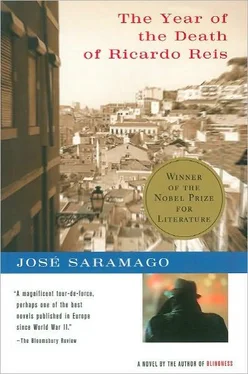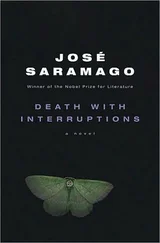José Saramago - Year of the Death of Ricardo Reis
Здесь есть возможность читать онлайн «José Saramago - Year of the Death of Ricardo Reis» весь текст электронной книги совершенно бесплатно (целиком полную версию без сокращений). В некоторых случаях можно слушать аудио, скачать через торрент в формате fb2 и присутствует краткое содержание. Год выпуска: 1992, ISBN: 1992, Издательство: Houghton Mifflin Harcourt, Жанр: Современная проза, на английском языке. Описание произведения, (предисловие) а так же отзывы посетителей доступны на портале библиотеки ЛибКат.
- Название:Year of the Death of Ricardo Reis
- Автор:
- Издательство:Houghton Mifflin Harcourt
- Жанр:
- Год:1992
- ISBN:9780547546926
- Рейтинг книги:4 / 5. Голосов: 1
-
Избранное:Добавить в избранное
- Отзывы:
-
Ваша оценка:
- 80
- 1
- 2
- 3
- 4
- 5
Year of the Death of Ricardo Reis: краткое содержание, описание и аннотация
Предлагаем к чтению аннотацию, описание, краткое содержание или предисловие (зависит от того, что написал сам автор книги «Year of the Death of Ricardo Reis»). Если вы не нашли необходимую информацию о книге — напишите в комментариях, мы постараемся отыскать её.
Year of the Death of Ricardo Reis — читать онлайн бесплатно полную книгу (весь текст) целиком
Ниже представлен текст книги, разбитый по страницам. Система сохранения места последней прочитанной страницы, позволяет с удобством читать онлайн бесплатно книгу «Year of the Death of Ricardo Reis», без необходимости каждый раз заново искать на чём Вы остановились. Поставьте закладку, и сможете в любой момент перейти на страницу, на которой закончили чтение.
Интервал:
Закладка:
The tram has come and gone, Ricardo Reis has found a seat all to himself. The ticket cost seventy-five centavos, in time he will learn to say, One at seven and a half. He resumes his reading of the funeral oration, unable to convince himself that it is dedicated to Fernando Pessoa, who must be dead if we look at the press reports, because the poet would not have tolerated such grammatical and lexical bombast. How little they must have known him, to address him and speak of him in this way. They take advantage of his death, his feet and hands are bound. They call him a despoiled lily, a lily like a girl stricken by typhoid fever, and use the adjective gentle. Such banality, dear God. Since gentle means noble, chivalrous, gallant, elegant, pleasing, and urbane, which of these would the poet have chosen as he lay in his Christian bed in the Hospital of Sao Luis. May the gods grant that it be pleasing, for with death one should lose only life.
When Ricardo Reis reached the cemetery, the bell at the gate was ringing, its peals filled the air with the sound of cracked bronze like the bell of some rustic villa ringing out in the drowsy heat of the siesta. About to disappear, a bier was carried by hand, its funeral valances swaying, the women's faces covered with black shawls, the men attired in their Sunday best, purplish chrysanthemums in their arms, more chrysanthemums on the upper ledges of the coffin, not even flowers enjoy a common destiny. The bier disappeared into the depths and Ricardo Reis went to the registry office to inquire where he might find the grave of Fernando Antonio Nogueira Pessoa who died on the thirtieth day of last month, buried on the second of this month, laid to rest in this cemetery until the end of time, when God will command poets to awaken from their temporary death. Realizing that he is in the presence of an educated man of some standing, the clerk carefully informs him about the road and the number, for this is just like any city, sir. In order to make quite certain that his instructions are clear, he comes around the counter, accompanies him outside, and points, Go straight down the avenue, turn right at the bottom, then straight ahead, it's on the right-hand side about two-thirds down the path, look carefully, the tomb is small and you could easily miss it. Ricardo Reis thanks him for his assistance. The winds that come from afar over sea and river, he does not hear them wailing as one might expect in a cemetery, there are only these gray skies, these damp marble stones glistening after the recent rain, the dark-green cypresses darker than ever. As instructed, he starts to descend the road lined with poplars, in search of the grave numbered four thousand three hundred and seventy-one, a number which was drawn in the lottery yesterday and will be drawn no more, drawn by destiny rather than fortune. The road slopes gently downward, one is almost strolling. At least those remaining few steps were not difficult, that final walk of the funeral procession, for nevermore will Fernando Pessoa be accompanied, if during his lifetime he was truly accompanied by those who brought him here. Here is the corner we must take. We ask ourselves why we came, what tears remain to be shed, and why, if we did not shed them before. Perhaps we were more shocked than grieved, the sorrow came later, dull, as if our entire body were a single muscle being crushed internally, no black stain visibly locating our grief. On either side, the chapels of the family tombs are locked, the windows are covered with curtains made of lace, the finest linen like that of handkerchiefs, the most delicate flowers embroidered between two plants, or in heavy crochet made with needles like naked swords, or saying richelieu or ajour, Gallicisms pronounced God alone knows how. It reminds me of those children on the Highland Brigade , now far, far away, sailing northward over seas where the salt of Lusitanian tears is that of fishermen amid the waves that claim their lives and of their families crying on the shore. The threads of this embroidery were made by the Coats and Clark Company, Anchor Brand, so as not to stray from the disasters of maritime history. Ricardo Reis has already proceeded halfway along the path, constantly looking to the right. Eternal regret, Sad remembrance, Here lies in loving memory of, we would see the same inscriptions if we looked on the other side, angels with drooping wings, lachrymose statues, fingers entwined, folds carefully arranged, drapes neatly gathered, broken columns. Perhaps the stonemasons cut them like that, or delivered them in perfect condition so the relatives of the deceased could break them as a token of their grief, like those warriors who marked the death of their leader by solemnly smashing their shields. Skulls at the foot of the crosses. The evidence of death is the veil with which death masks itself. Ricardo Reis has gone past the tomb he was looking for. No voice called out, Hello, it's here, yet there are still those who insist that the dead can speak. What would become of the dead if there were no means of identifying them, no name engraved on a tombstone, no number as on the doors of the living. A good thing they taught us how to read, for you can imagine some illiterate needing to be led by the hand and told, The tomb is here. He will look at us suspiciously, because should we mislead him, either out of error or malice, he would find himself praying to Capuletto instead of Montecchio, to Gonçalves instead of Mendes.
These are titles of property and occupation, the tomb of Dona Dionísia de Seabra Pessoa inscribed on the front, under the overhanging eaves of this sentry box where the sentinel, a romantic touch, is sleeping. Below, at the height of the door's lower hinge, another name and nothing more, that of Fernando Pessoa, with the dates of his birth and death, and the gilded outline of a funeral urn that says, I am here. Ricardo Reis repeats the words aloud, He is here. At that moment it starts raining again. He has traveled so far, all the way from Rio de Janeiro, days and nights on the high seas, the voyage seems so recent and yet so remote, now what is he to do, alone in this road, among graves, his umbrella open. Time to be thinking about lunch. In the distance he could hear the hollow sound of a bell tolling, the sound he had expected to hear upon arrival, when he touched these railings, his soul gripped by panic, a deep laceration, an inner turmoil, like great cities collapsing in silence because we are not there, porticoes and white towers toppling. In the end nothing but a gentle sensation of burning in one's eyes, no sooner felt than gone, not even time to think about it or be troubled by the thought. There is nothing more to be done in this place, what he has done is nothing. Inside the tomb is a mad old woman who cannot be left to roam at will. Under her watchful eye is also the decomposing body of a composer of verses who left his share of madness in the world. The great difference between poets and madmen is the destiny of the madness that possesses them. He felt afraid, thinking about grandmother Dionísia lying in there, and about her afflicted grandson Fernando, she keeping vigil with eyes wide open, he with eyes averted, looking for a gap, a breath of air, a glimmer of light, his uneasiness turned to nausea as if he were being assailed and suffocated by a great sea wave, he who throughout the fourteen days of the voyage had not once been seasick. Then he thought, It must be my empty stomach, and he was probably right, for he had eaten nothing all morning. The rain came pouring down, arriving just in time. Now Ricardo Reis will have his answer ready if anyone questions him, No, I didn't spend much time there, it was raining so heavily. As he started to climb the road, walking slowly, he felt the nausea pass. All that remained was a slight headache, perhaps an emptiness in his head, like an absence, a piece of brain missing, the piece relinquished by Pessoa. He found his informant standing in the doorway of the registry, and it was obvious from the grease on the man's lips that he had just finished eating lunch. Where, right here, a napkin spread out on his desk, the food he brought from home, still warm because wrapped in newspapers, or perhaps reheated on a gas flame, there at the far end of the filing cabinets, interrupting his chewing three times to file. So I must have spent more time there than I thought. Then you found the tomb you were looking for. I found it, Ricardo Reis replied, and as he went through the gate he repeated, Yes, I found it.
Читать дальшеИнтервал:
Закладка:
Похожие книги на «Year of the Death of Ricardo Reis»
Представляем Вашему вниманию похожие книги на «Year of the Death of Ricardo Reis» списком для выбора. Мы отобрали схожую по названию и смыслу литературу в надежде предоставить читателям больше вариантов отыскать новые, интересные, ещё непрочитанные произведения.
Обсуждение, отзывы о книге «Year of the Death of Ricardo Reis» и просто собственные мнения читателей. Оставьте ваши комментарии, напишите, что Вы думаете о произведении, его смысле или главных героях. Укажите что конкретно понравилось, а что нет, и почему Вы так считаете.












